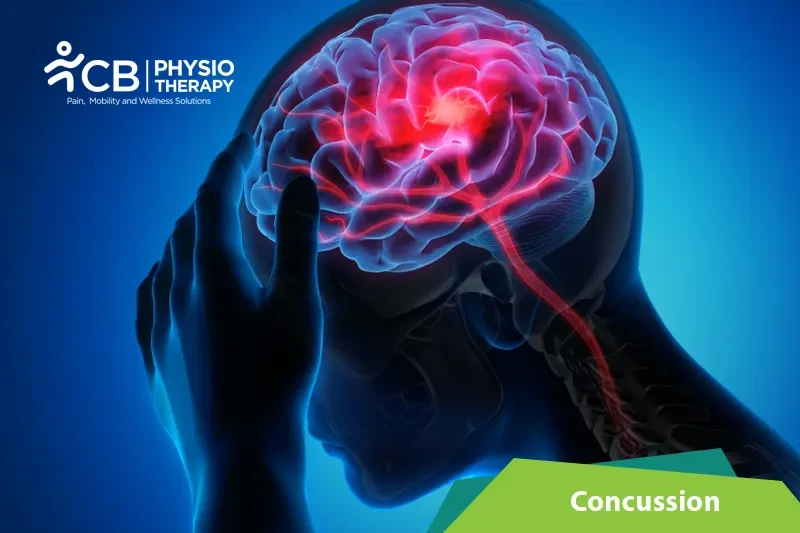
A concussion is a mild traumatic brain injury (TBI). The word comes from the Latin concutere, which means "to shake violently." A concussion is most often caused by a sudden direct blow or bump to the head. It can occur after an impact to head or after a whiplash-type injury that causes head and brain to shake quickly back and forth. A concussion results in an altered mental state that may include becoming unconscious. Anyone can become injured during a fall, car accident, or any other daily activity. Active participation in impact sports such as football or boxing, have an increased risk of getting a concussion.
Concussions are usually not life-threatening, but they can cause serious symptoms that require medical treatment. Effects are usually temporary but can include headaches and problems with concentration, memory, balance and coordination. A concussion is different from a contusion. A concussion specifically affects your brain, but contusions are bruises. Contusions can occur on your head, but they aren’t typically serious and tend to resolve within several days.
Concussions can be tricky to diagnose. Signs may not appear for days or weeks after the injury. Some symptoms last for just seconds; others may linger. Concussions are fairly common. But it's important to recognize the signs of a concussion so you can take the proper steps to treat the injury. There are some common physical, mental, and emotional symptoms a person may display following a concussion. Signs of traumatic brain injury include:
Concussions in Children
It's important to watch for behavioral changes. Young children, especially, may not be able to fully communicate what they’re feeling, so it is critical to watch them closely. Symptoms of concussions in children include:
Brain tissue is soft and squishy. It’s surrounded by cerebrospinal fluid, which acts as a cushion between it and the hard protective exterior, the skull. A concussion occurs when our brain bounces or twists inside the skull or experiences rapid, whiplash-type back and forth movement that causes it to collide with the inside of your skull. This brain movement stretches and damages brain cells and leads to chemical changes in the brain.
These injuries cause brain not to function normally for a brief period of time and result in the signs and symptoms of concussion. Motor vehicle accidents falls, and sports injuries are common causes of concussions. Any sport that involves contact can result in a concussion. Among children, most concussions happen on the playground, while bike riding, or when playing sports such as football, basketball, ice hockey, wrestling, or soccer.
A healthcare provider will ask about the event leading to your head injury, the symptoms experienced and perform a neurological exam. The neurological exam will check:
Verbal, written or computerized tests may be used to check:
Imaging with CT scan or MRI isn’t always needed in the early evaluation of concussion. This is because most of the effects of a concussion aren’t seen on imaging. However, these imaging tests might be ordered if more serious effects of a concussion are suspected – like bleeding inside the skull, brain swelling or spinal cord or cervical spine injury – or if symptoms are worsening
Treatment for a concussion depends on the severity of your symptoms. A patient suffering from concussion might need surgery or other medical procedures if he or she experiences, bleeding in the brain, swelling of the brain or a serious injury to the brain. However, most concussions don’t require surgery or any major medical treatment.
If the concussion is causing headaches, then the doctor may recommend over-the-counter pain relievers such as ibuprofen (Advil) or acetaminophen (Tylenol). Your doctor will also probably ask you to get plenty of rest, avoid sports and other strenuous activities, and avoid driving a vehicle or riding a bike for 24 hours or even a few months, depending on the severity of your injury.
Physiotherapy treatment
After a thorough concussion assessment that includes several concussion tests, a physiotherapist can differentiate the various causes of symptoms. Implementation of a treatment plan for concussion management would then follow, with a specialized focus on different symptom areas.
Cervical spine issues after a concussion
If the neck or spine has been affected by the concussion an injury, a physiotherapist can help with:
Vestibular problems involving dizziness or imbalance can be helped with:
If vision is affected after a concussion, ocular reflex training can prescribe to improve visual motor control to reduce visual disturbances.
Exertion issues after a concussion
If exertion is a problem, exercise prescriptions should be part of a concussion management plan, with incremental progression of individually tailored exercises
Select your City to find & connect with our experts regarding Physiotherapy for Concussion